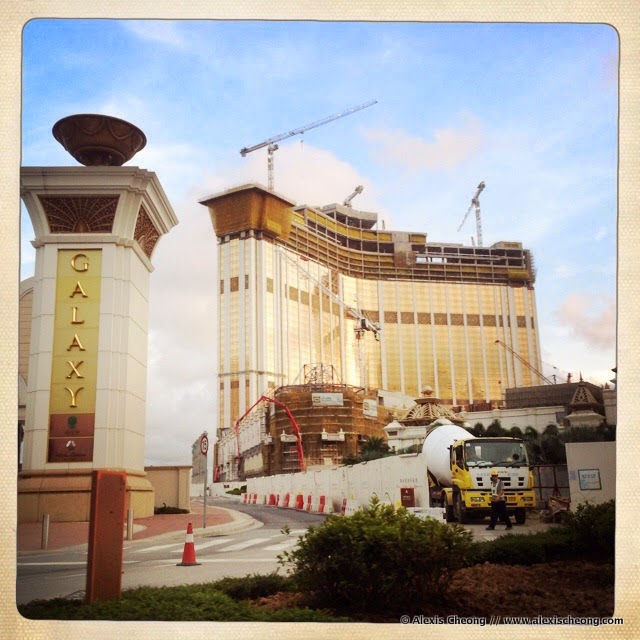It is a city filled with glittering hotels the size of palaces amidst run down buildings with sundry hanging on rusty metal grilles while pawn shops pulsate with neon lights all around. This is probably true for a lot of cities, but the contrast between modern and old, between what shines and what rots, is especially pronounced in Macau where casinos and Chinese people are the primary economic force driving the country's growth. This is the city for my gastronomic food tour this year in July, and the subject of this post.
Before casinos (BC), Macau was originally a sleepy fishing colony run by the Portugese. Little colonial houses, alleys and town squares were built in Coloane, not to mention the olden part of Macau. Then the casinos/hotels started 10 year ago, expanded to Taipa, and now we have two worlds in one city in between Hong Kong and China.
In 10 years Macau has transformed to become the playground in Asia for the rich Chinese looking to gamble and play. Singapore's two casinos are no match. Macau is so rich from the casino trade that it gives a substantial amount of cash payouts (~$1k SGD) to every citizen and PR every year under their Annual Wealth Partaking Scheme. It's perhaps the compensation for having to deal with so many tourists every day, maybe.
I remember a conversation I had in the car on the way to dinner with my sister Felicia, who lives in Taipa. She commented, "Phase 2 of the Galaxy started 6 months ago and it already looks like this. It's very obvious that they are rushing it so it can be built by the end of the year."
"Why?"
"To make money!"
"Aren't they already making money now?"
"Yes."
"Oh. So it's to make more money."
While there is such rapid development of hotels, the rest of Macau hasn't managed to catch up. As a result, what I found was a cultural black hole. Want some art? Walk through the lobbies of the hotels. Entertainment? Imported from all over the world to dance and sing in hotel casinos or clubs. It seems just slightly sad, but who am I to say since I come from Singapore, a city state known for importing everything and not having any cultural underpinnings?
Fortunately, the saving grace lies in food. It probably always does. In food some of real Macau is expressed through Portuguese egg tarts, pork chop buns, serradua cake, milk tea and those delicious candy pastry things from that famous shop that everyone will buy from. Not to mention Macanese cuisine, which takes Portuguese cuisine and infuses it with the local touch. Now every tourist is lapping them up while locals deal cards and drive taxis.
Thats's not what I am there for though. These things have become almost obvious. Casinos, gambling, egg tarts and pork chop buns. I travelled to Macau because I want to experience a side of it that's not commonly had. And that is fine dining in Macau.
How is it possible that there's anything fine with dining in Macau, you wonder? Well, with the explosion of hotels came the proliferation of restaurants and chefs, and its not just any bland chain, but Michelin-starred ones for every cuisine, from French to Portuguese to even Cantonese. In the recent years they have polished up the silverware and imported everything required to take dining to the next level.
As a Singaporean foodie I feel that it is my duty to explore that scene in Macau and see what I have been missing out. The plus side of it is also fine dining in Macau is surprisingly AFFORDABLE compared to Singapore's by at least 20-30% so of course I couldn't resist to suss them out and recommend it to all my readers!
Stay tuned for my blog posts that will review these restaurants:
1. Jade Dragon at City of Dreams, fine Cantonese
2. Vida Rica's guest Portuguese chef feature, Jose Avillez, fine Portuguese
3. Bravo Palace, 1/F Lisbon 2, Macau Fisherman's Wharf, Cantonese
4. BarCelona Spanish Tapas at No 16, Rua de Venceslau de Morais, Spanish Catalunyan
5. Henri's Galley, traditional Macanese cuisine
6. Joel Robouchon au Dome, Grand Lisboa, fine French cuisine










Post a Comment